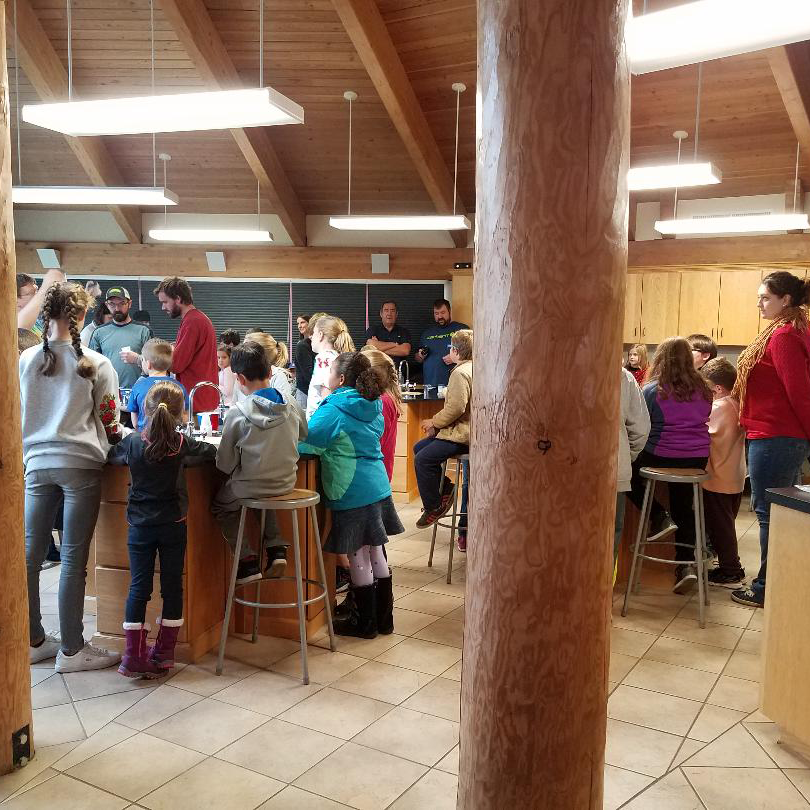Sturgeon Bay, Wis. (January 12, 2023) – “Changing Garden Trends over the Next Decade” is the topic of the Master Gardener Live Zoom Lecture at Crossroads at Big Creek on Thursday evening, January 19, at 6:30 p.m. Ed Lyons, Director of the Reiman Gardens at Iowa State, will kick off this popular lecture series in which the public is invited to watch the Zoom presentation in the lecture hall at Crossroads or from home on Zoom. Consequently, the program will take place even if we receive insulating snow that night.
As you may have guessed, Crossroads’ educational topic for the week is insulation. The children in the Junior Nature Club and several school groups will learn that insulation is a barrier—whether one is talking about heat, sound or electricity. This time of year, we generally think of insulation as something that keeps heat in and cold out.
So, our young visitors will be discussing such things as the hollow hairs of the winter pelts of deer, and the woolly insulating hairs of woolly bear caterpillars.
We will also watch our bird feeders and marvel at the fact that our goldfinches and chickadees have approximately 1,100 feathers in summer and 2,500 in winter. (I’m not sure who counted!) We can observe the birds puffing their feathers, trapping air. Their body heat warms the air. So the feathers and trapped air form an insulation barrier to keep the warm in and the cold out.
But we wouldn’t have wildlife to observe if we didn’t have plants. Our native trees have thick bark that acts as insulation, but what about the roots? It turns out that, most years, forest trees have excellent insulation.
In fall, leaves fall. A layer of fallen leaves creates a natural mulch which not only helps retain moisture, but also offers an insulating barrier to protect the tender, near-surface roots from cold in the winter and from extreme heat in the summer.
In forests, and in gardens, the ideal situation is leaf mulch covered by a layer of snow. Understand that snow is mostly (90-95%) trapped air. Just like the air trapped in chickadee feathers, the air trapped in snow forms an insulating barrier which protects the tender roots of trees and other plants from extreme and rapid temperature changes and, in late winter, damaging freeze/thaw cycles and frost heaves which rip unprotected roots tips to shreds.
That makes our recent snowless period concerning. Is this lack of snow a trend?
Our Zoom speaker, Ed Lyons, writes that “Upcoming trends will have a greater sense of urgency and will be, more often than in the past, directed by forces out of our control.
“Gardening will become as much a necessary mission as it is recreational,” Lyon said. “Interesting times bring interesting opportunities, and I will give you a look at what they might be.”
As mentioned, snow is mostly air, so it takes quite a bit of the fluffy stuff to create a base and to begin grooming ski trails. We will do that as soon as we have adequate snow. But for now, Ski-for-Free is closed for the foreseeable future.
Our trails are open for hiking, and on Saturday afternoons, we will offer Saturday Science. Families and learners of all ages are invited to drop in at the Learning Center. We will have a fire in the fireplace and hot chocolate for those who want to warm up, and in the lab (and sometimes the lecture hall), we will offer a variety of fun, hands-on science activities.
On January 21, between 1:00-4:00 p.m., Saturday Science will be an Indoor Fossil Hunt in which participants can learn about the fossils of Door County, search for fossils in our rock walls and displays and create a fossil model to take home. Each participating family will receive a free Door County fossil pamphlet.
Crossroads at Big Creek Learning Center and Nature Preserve is located at 2041 Michigan. Crossroads is a 501(c)3 organization committed to offering education, conducting research and restoration, and providing outdoor experiences to inspire environmental stewardship in learners of all ages and from all backgrounds. We welcome your support! Become a member of Crossroads by mailing a contribution to P.O. Box 608, Sturgeon Bay, WI 54235, or donate online at crossroadsatbigcreek.org.



 ALL CONTENT © 2024 BY DOOR GUIDE PUBLISHING
ALL CONTENT © 2024 BY DOOR GUIDE PUBLISHING




